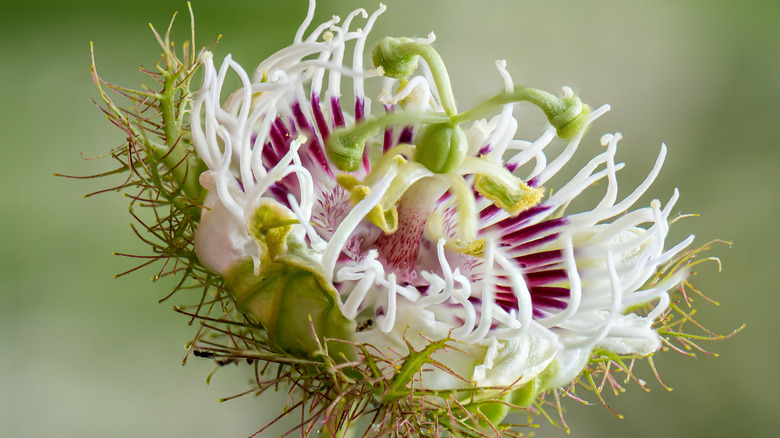
Anxiety is a fact of life for many people. Searching for a natural antidote can bring much-needed relief when you need support to mitigate racing thoughts. Between St. John’s Wort, Magnesium supplements and Passionflower extract, there are tons to choose from.
According to VeryWell Health, passionflower treats anxiety, hysteria, seizures and insomnia by helping soothe the central nervous system. While more studies are still needed to prove its efficacy, Passionflower is thought to spur GABA production. An essential amino acid that calms the mind and body, adequate GABA levels are imperative to feeling relaxed and in the moment. Indeed, Healthline notes, GABA decreases brain activity, helping your thoughts slow down and soothing your nervous system. The outlet cites two studies that found passionflower teas and tinctures helped relief symptoms of anxiety and aided in sleep hygiene.
Another strain of the flower, called stinking passionflower, aids in stomach health as well. Since the gut microbiome and your mood are thought to be linked, this benefit may impact your mental state also. Passiflora foetida may contain antioxidants that combat stomach ulcers and other digestive issues. By having passionflower in your pantry, you can feel more calm with a soothed stomach at any time.
Passionflower comes in a variety of forms

If you’ve ever tried passionflower tea, you’ll know that it tastes fruity and sweet. To reap the benefits of this tasty plant, you can use this option or a variety of others to feel calmer. VeryWell Health recommends 2.5 grams of passionflower infusions three or four times each day when using it as an anti-anxiety remedy. Many people swear by extracts of the flower or tinctures that preserve the plant’s benefits. If you’re ingesting a tincture, try between 10 and 60 drops three times a day, the outlet suggests. However, extracts tend to be much more concentrated. When using this type of medicine, stick between 10 and 30 drops three times a day. Lastly, you can take passionflower in capsule form as well.
Of course, check the label and check with your doctor to ensure there are no complications. Medicines that have interactions include benzodiazepines, narcotics, barbiturates and antihistamines — if you take any of these, it’s wise to avoid passionflower altogether. But, if you’re in the clear, start with a small amount and work your way up once you see how it affects you.
Passionflower may cause drowsiness and dizziness; if you experience these symptoms, it’s best to steer clear or reduce your dosage. However, the calm feelings that many notice can help reduce your reaction to stress and soothe your mind. If you’re on the natural route, it’s worth a shot!
Source: Read Full Article